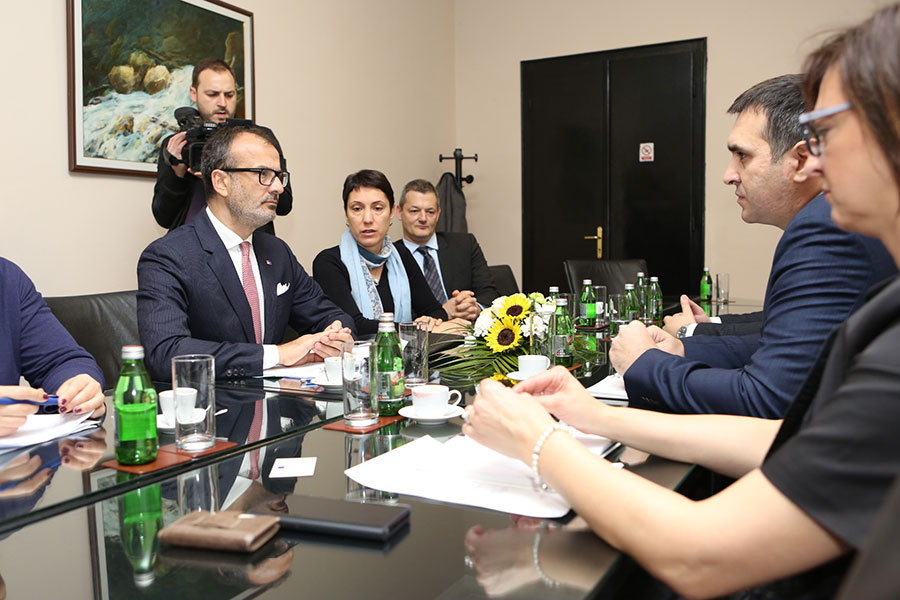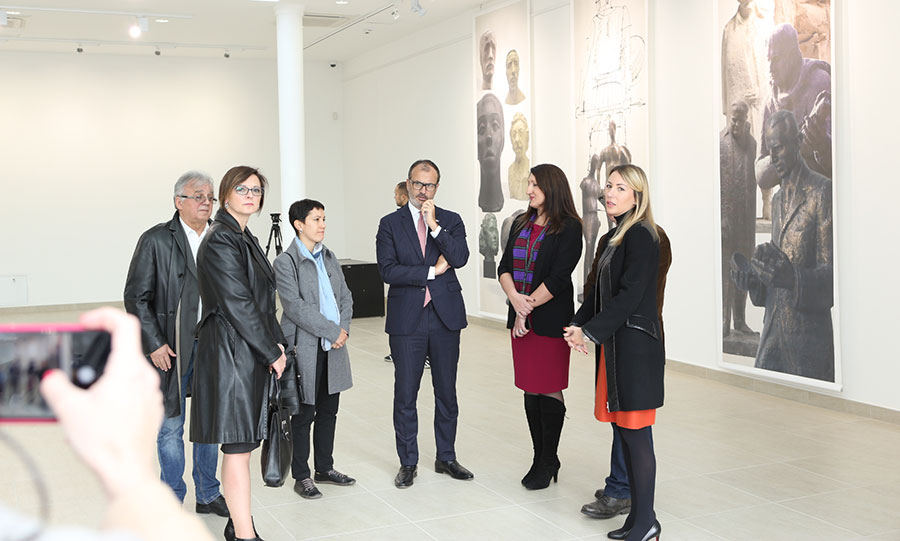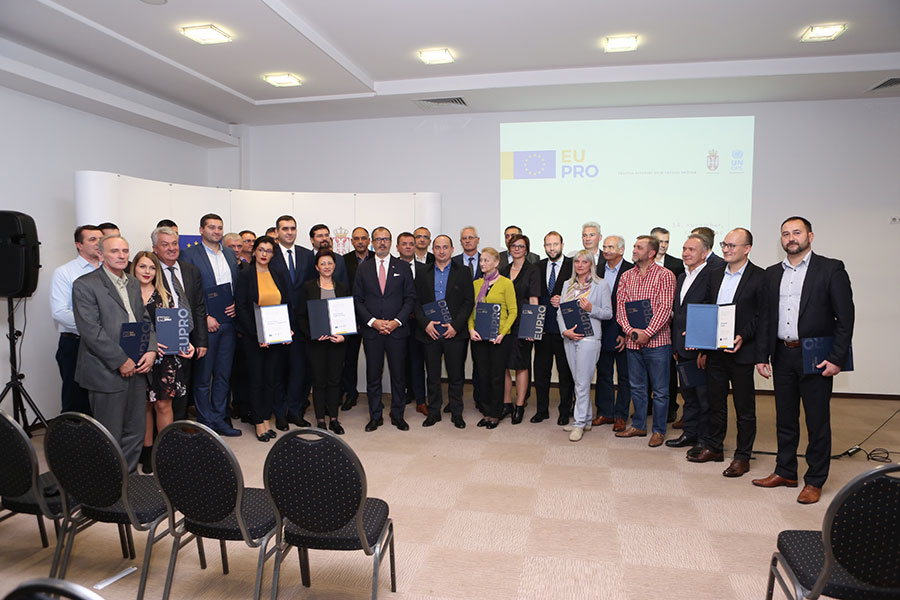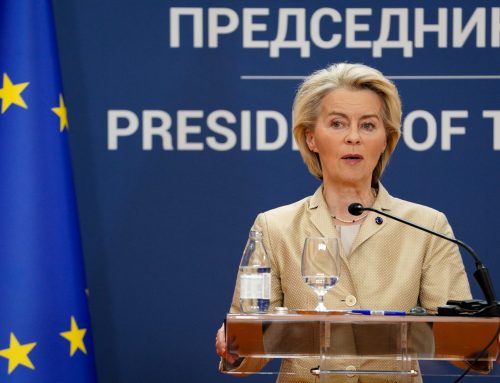“The European Union offers continued support for local development and has so far invested EUR300 million. Investments in business infrastructure development will enable improvement of the overall business environment in Serbia, attract investments and improve the lives of citizens at the same time,” Head of the Delegation of the European Union (EU) to Serbia Ambassador Sem Fabrizi said in Kragujevac today. He congratulated the representatives of 34 local self-governments[1] whose 40 projects have been approved for funding through the EU PRO development programme.
The local self-governments will implement 12 projects concerning the development of project technical documentation, 19 projects aimed at development of planning documents and nine business infrastructure projects, thus creating for heightened economic activity and investment attracting.
Ambassador Fabrizi congratulated the staff of local administrations for putting knowledge and effort into the preparation of these high quality projects and the mayors who provided political leadership and vision.
Also, the Head of the EU Delegation noted that local self-governments are important partners in the European integration process, as more than 70 percent of the EU legislation is implemented at the local level, which is why local self-governments and local communities should be included in the EU accession process.
“The Ministry of European Integration supports the implementation of the Programme as it ensures sustainable development of local self-governments with a reduction of regional disparities and continued capacity strengthening of towns and municipalities to use European funds,” said Branko Budimir Assistant Minister of European Integration. He added that support for business environment improvement is an essential factor in the overall progress of local self-governments.
In the coming period, activities will be carried out with a view to developing similar programmes and obtaining support from development partners, one of which is the EU, for the implementation of those programmes.
In Kragujevac, two projects worth nearly EUR800,000 will be implemented. One concerns the revitalisation and expansion of a brownfield site in the industrial zone of Kragujevac while the other deals with development of technical documentation of a bridge over the river Lepenica.
 “EU PRO bears even greater importance for Kragujevc and Sumadija as this part of the country had no access to this sort of development assistance and it makes me proud that we were ready when we received the offer because it proves that we are strategically oriented in our work and have a long term vision for the development of the city and the region as a whole,“ said Radomir Nikolic, Kragujevac Mayor, adding that local self-governments are reliable partners of international organisations and that central governments can substantially contribute to efficient design and implementation of development projects and policies.
“EU PRO bears even greater importance for Kragujevc and Sumadija as this part of the country had no access to this sort of development assistance and it makes me proud that we were ready when we received the offer because it proves that we are strategically oriented in our work and have a long term vision for the development of the city and the region as a whole,“ said Radomir Nikolic, Kragujevac Mayor, adding that local self-governments are reliable partners of international organisations and that central governments can substantially contribute to efficient design and implementation of development projects and policies.
During a tour of the Nikola Koka Jankovic’s Legacy Building – constructed thanks to a joint effort by Kragujevac and the European Investment Banks which have invested EUR680,000 – the Head of the EU Delegation to Serbia Sem Fabrizi said that the EU supports and promotes Serbian cultural heritage as an integral part of European cultural heritage
“Serbian culture has an important and longstanding tradition. It has always been and will always be a part of European cultural heritage,“ Ambassador Fabrizi said.
As he put it, 2018 was proclaimed the year of cultural heritage in both Europe and Serbia and the EU supported culture through various projects, including the reconstruction of Subotica Synagogue, rehabilitation of the Fortress in Bac. By the end of 2018, he said, the reconstruction of Golubac Fortress, a medieval architecture monument, should be completed.
 Head of the EIB Western Balkans Regional Office Dubravka Negre said that even though Nikola Koka Jankovic is seen by some critiques as a traditionalist, unrestrained by the desire to be contemporary, the sculptor’s legacy now occupies one of the most contemporary buildings of Serbian architecture.
Head of the EIB Western Balkans Regional Office Dubravka Negre said that even though Nikola Koka Jankovic is seen by some critiques as a traditionalist, unrestrained by the desire to be contemporary, the sculptor’s legacy now occupies one of the most contemporary buildings of Serbian architecture.
“I am happy that EIB supported the construction of his Legacy Building. The Building is just a fraction of EUR8 million invested over the past years in Serbian culture,“ Dubravka Negre said.
The Head of the EU Delegation met in Kragujevac with the Mayor Radomir Nikolic and representatives of regional development agencies with whom he discusses local development priorities and the role of local self-governments and regional agencies in the process of European integration.
The European Union supports the activities of the EU PRO, a programme aimed at promoting a more balanced socio-economic development of Serbia, with a total of EUR25 million. The programme seeks to improve competitiveness of micro and small enterprises and the business environment and to advance social cohesion in 99 local self-governments in two Serbian regions: Sumadija and Western Serbia, and Southern and Eastern Serbia. All activities on the ground are implemented by the United Nations Office for Project Services (UNOPS).




